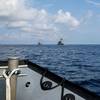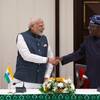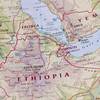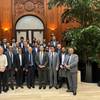Forward deployed Sailors attached to Mobile Security Detachment (MSD) 71 are currently deployed to Iraq’s two critical oil platforms, the Al Basrah (ABOT) and Khawr Al Amaya (KAAOT) oil terminals, conducting maritime security operations (MSO).
As a part of Commander, Task Force (CTF) 158, MSD 71, based in Guam, arrived on station April 9 to train and work alongside Iraqi marines in point defense operations of the oil terminals.
“We act in a Military Training Team mode and oversee their day-to-day operations to ensure that they’re securing the platforms in accordance with the procedures established for the inner defense layer of the terminals,” said Lt. Cmdr. Kenneth Miller, MSD 71 officer in charge.
After relieving MSD 31 on the oil terminals, Miller said the detachment immediately commenced intermediate training of the Iraqi platoons. MSD 71 personnel routinely listen in while their Iraqi marine counterparts communicate with marine vessels in the vicinity of the oil platforms. If a problem occurs, the MSD 71 watchstander will monitor the trainee as he gradually figures out how to handle problems on his own.
“We’re trying to get them up to where they can take over protection of their own assets,” said Master-at-Arms 1st Class Brian Crump, the MSD 71 leading petty officer aboard KAAOT.
ABOT and KAAOT are significant sources of revenue for the Iraqi people – revenue that is important to the rebuilding of Iraq. U.S. forces have been aboard the oil terminals since April 2004, after insurgents attempted to attack the oil platforms with an explosive-filled fishing dhow.
MSO help set the conditions for security and stability in the North Persian Gulf and protect Iraq’s sea-based infrastructure, which provides the Iraqi people the opportunity for self-determination. MSD 71’s training is designed to train the Iraqis to independently protect their high-value assets and territorial waters.
For their part, Miller said the Iraqis are model students who eagerly embrace the exchange of information between them and their U.S. counterparts.
“We share weapons knowledge and tactics with each other,” explained Miller. “They’re very open to what we have to teach them, and very eager to take over this mission in full, so that one day, they can be responsible for the protection of the terminals with no oversight from coalition forces.”
Source: NavNews
By Journalist 2nd Class Cassandra Thompson, Commander, U.S. Naval Forces Central Command/Commander, U.S. 5th Fleet Public Affairs
Featured videos

Inside the Electrified Truckable Tug

Tracking Foreign Vessels Working in the U.S. Jones Act Market

Inmarsat Enhances Service to Drive Digitalization
Subscribe for
Maritime Reporter E-News
Maritime Reporter E-News is the maritime industry's largest circulation and most authoritative ENews Service, delivered to your Email five times per week









